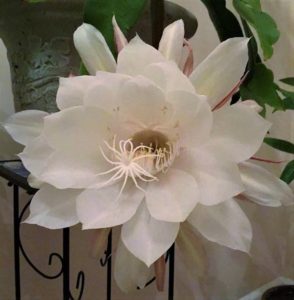I am writing down the following thoughts for my young friends. Growing up in the fast-paced digital world, new delights come along every second. It is hard for young minds to settle down, look around and appreciate all the wonders around them.
When I was very little, I heard adults talking about how rice, if eaten slowly and allowed to linger in one’s mouth, would taste very sweet. Mom, always wanting us to chew our food carefully, encouraged me to try. I wasn’t too disappointed: The rice was sweeter.
Jin Shengtan (金勝歎), a celebrated 17th-century Chinese writer, was believed to have said that, when eating together, dried tofu and peanuts would taste like ham. How could a child who loved to eat not to try this trick? Well, I wasn’t too impressed by the result. Nevertheless, I learned that there were always ways to make everything in life more interesting.
One of my favorite German Lieder is “Auch kleine Dinge” by Hugo Wolf, the first piece in his Italienisches Liederbuch (Italian Songbook). The German text, adapted by Paul Heyse, reads:
Auch kleine Dinge können uns entzücken,
Auch kleine Dinge können teuer sein.
Bedenkt, wie gern wir uns mit Perlen schmücken;
Sie werden schwer bezahlt und sind nur klein.
Bedenkt, wie klein ist die Olivenfrucht,
Und wird um ihre Güte doch gesucht.
Denkt an die Rose nur, wie klein sie ist,
Und duftet doch so lieblich, wie ihr wißt.
(Even little things can amuse us. They can be precious. Just think how gladly we put on pearls. They are small but costly. Think how small olive fruits are. But their good taste made them sought after. Think about roses. Think how small they are. But they smell so lovely, as you know.)
The folk Italian version is even more direct:
Le cose piccoline son pur belle!
Le cose piccoline son pur care!
Ponete mente come son le perle:
son piccoline, e si fanno pagare.
Ponete mente come l’è l’uliva:
l’è piccolina, e di buon frutto mena.
Ponete mente come l’è la rosa:
l’è piccolina, e l’è tanto odorosa.
(Some things are tiny yet beautiful. Some things are tiny yet dear. Think how pearls are: they are small, but they make us pay [dearly]. Think how it is with olive: It is tiny, and it brings wonderful fruits. Think how it is with rose: it is tiny, and it is very fragrant.)
During my first winter in New York, while establishing connection, I spent most of my hours playing through various standard repertoire. One quiet afternoon, I picked up the Italienisches Liederbuch. Unlike many other works of Wolf, intricate and capricious, “Auch kleine Dinge” was uncomplicated and graceful. Paperwhites that I picked up at the flower district had just bloomed. Their beautiful scent, which I always associated with childhood Chinese New Year celebrations, drifted around the room. The image of the jewel-like flowers, the fragrance and the flowing high notes in the introduction made a permanent imprint in my memory.
Wonders are everywhere in life. They can be as plain as a few grains of white rice; as common as peanuts and tofu; as small as pearls and flowers or as insignificant as olives. Often, I am amused by the process of finding joys in otherwise mundane things. And, I love the small fireworks that exploded within me when small wonders touch my life.
“Auch kleine Dinge,” Hugo Wolf:
Performed by Diana Damrau, soprano and Helmut Deutsch, piano

